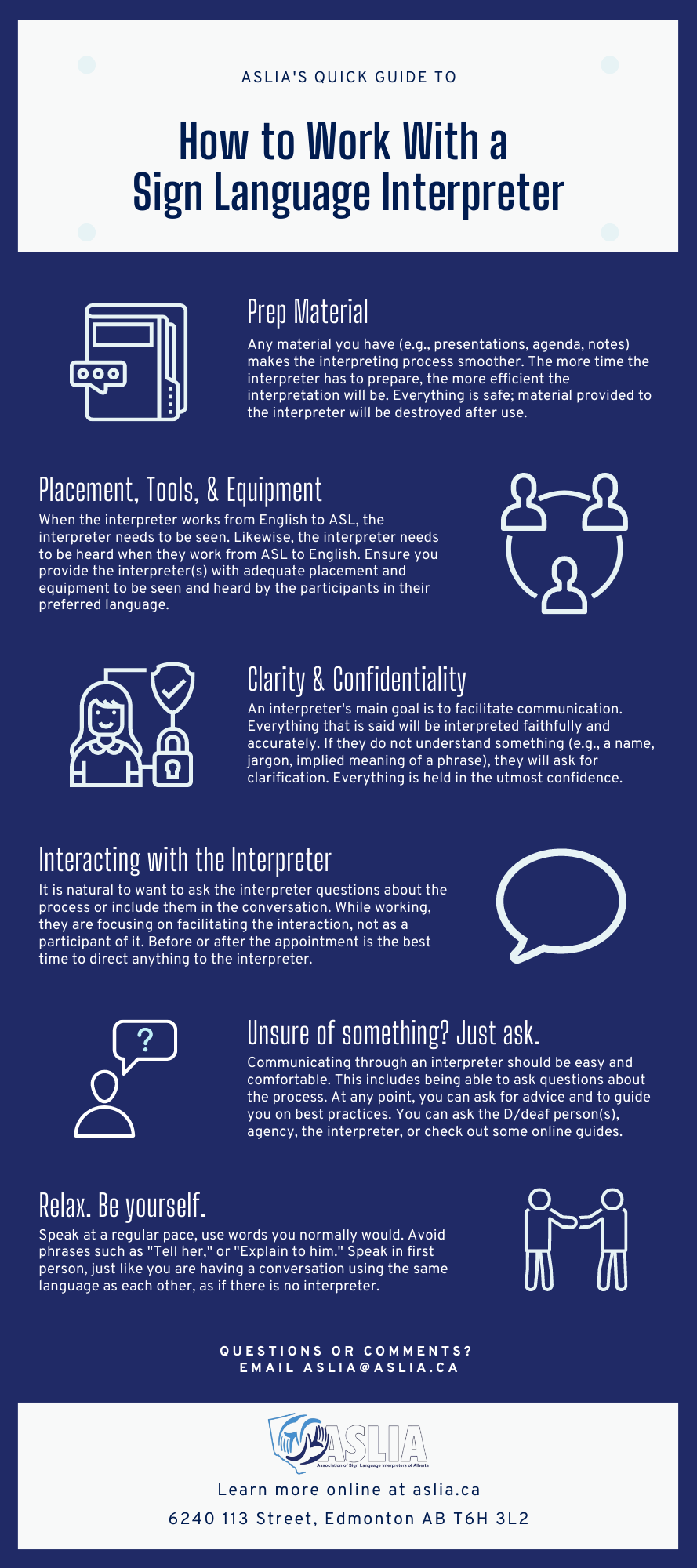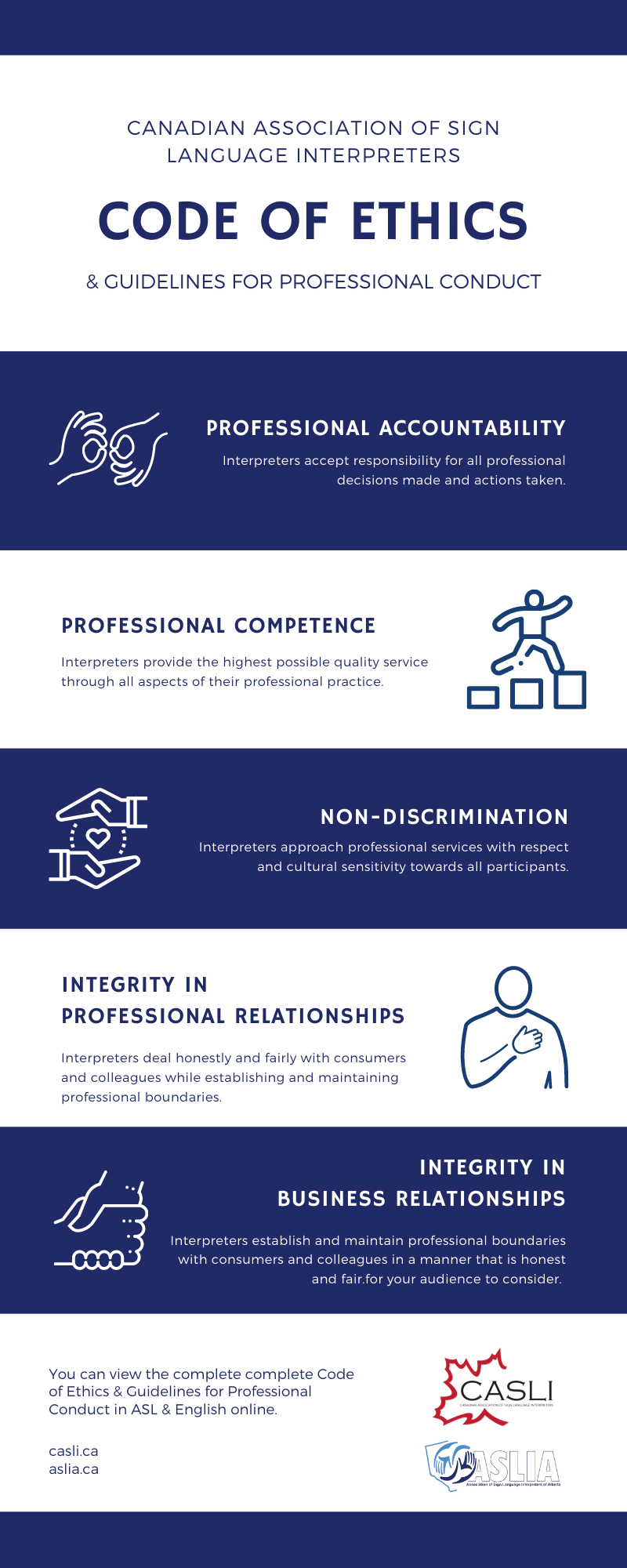About Sign Language Interpreting
There are certifications and different types of sign language interpreters. Deaf Interpreters and hearing interpreters all play a vital role in an effective communication process.
What is a Sign Language Interpreter?
An interpreter may be requested when two or more people, or groups, do not share a common language in order to communicate with each other. Qualified interpreters possess formal training, sophisticated language fluency, and are familiar with communication norms across a broad range of settings.
What is a Deaf Interpreter?
At times, the services of a Deaf Interpreter may be required in order to meet the communication needs of the parties involved in a particular setting. A Deaf Interpreter is a native signer, possesses training and is a recognized member of the Deaf Community. A Deaf Interpreter/s can be used in various settings and is an integral part of the interpreting team.
What is an Oral Interpreter?
In addition to Sign Language Interpreters, some Deaf and Hard of Hearing people may lip or speech read and require the services of an Oral Interpreter, whose role is identical to that of a Sign Language Interpreter.
Why hire an ASLIA member?
The field of sign language interpreting is unregulated. This can lead to many misunderstandings and misrepresentations when defining what is a sign language interpreter compared to someone who knows sign language. As ASLIA and CASLI members, professional sign language interpreters are:
- required to comply to the Code of Ethics and Guidelines for Professional Conduct
- can be held accountable for their actions through the CASLI Code of Ethics and Guidelines for Professional Conduct
- graduated from a CASLI-recognized Interpreter Education Program
This is in place for quality assurance and protection of those (Deaf and non-deaf) who receive interpreting services.
What is Video Remote Interpreting (VRI) and Video Relay Service (VRS) interpreting?
Video Remote Interpreting (VRI) is where the interpreter is located in a separate location than one or more of the other participants. The participants of the meeting will connect via a videoconferencing platform, such as Zoom, Teams, or Skype.
Video Relay Service (VRS) interpreting is a telecommunication service. In Canada, it is regulated by the Canadian Radio and Telecommunications Commission (CRTC). The service was not designed for appointments that are lengthy or complex in nature, such as staff meetings, legal processes such as an Examination for Discovery, or a family consultation at a hospital regarding a loved one and end of life care. Based on the legislation, VRS cannot be used when two people who need an interpreter are in the same room.
For more information about Video Remote Interpreting, click here to read our position paper on VRI Interpreting.
What is the difference between a professional interpreter and Certified Interpreter?
All members of ASLIA have completed the necessary training to provide sign language interpreting services. Interpreters in Canada have the option of achieving their Certificate of Interpretation (COI) through the national organization, Canadian Association of Sign Language Interpreters (CASLI). In Canada, the COI is not a requirement for members to work as an interpreter. It is strongly recommended for CASLI members to work toward this certification.
How do I hire an interpreter for an event?
There are multiple avenues to hire an interpreter for an event, meeting, or appointment. Email aslia@aslia.ca or see this section on our website about agencies and our directory of members.
Learn Sign Language
Edmonton
American Sign Language Deaf Culture Studies Certificate
Lakeland College: 780.691.1711
American Sign Language (ASL) Classes
University of Alberta: 780.492.3381
Metro College: 780.428.1111 or 1.877.202.2003
Calgary
Signing Naturally
Deaf and Hear Alberta (DHA)
403.284.6200 or 1.877.711.3447
American Sign Language (ASL) classes
University of Calgary: 403.220.2886 or 1.866.220.4992
Chinook College: 403.777.7224
Become an Interpreter
The interpreting profession is vibrant with continual growth. Interpreting can be a highly flexible career, lending itself to a variable schedule with the opportunity to specialize in a fields such as education, medical, legal, social, employment, and video relay services. With the advancement of national certification and our broadening communities, there are possibilities for national and international mobility. In Canada, there are five recognized ASL-English Interpreter Education Programs.
Interpreter Education Programs in Alberta
Edmonton
Sign Language Interpretation (Diploma)
Lakeland College - Edmonton
www.lakelandcollege.ca
Professional Certifications
Canadian Evaluation System
Conferred by the Canadian Association of Sign Language Interpreters (CASLI)
COI - Certificate of Interpretation
Holders of this national certification have successfully completed the Canadian Evaluation System (CES) which is comprised of the following:
WTK - Written Test of Knowledge
A 75 question, multiple choice test that ensures appropriate theoretical knowledge in the field of American Sign Language and English interpretation. Candidates are successful with a final grade of 70% or greater.
-and-
TOI - Test of Interpretation
A practical application on the ability to provide message-equivalent interpretation between American Sign Language and English. The TOI focuses on interpretation samples from an ASL to English monologue, English to ASL monologue and two interactive scenarios. Under the guidance of a facilitator, candidate testing materials are rated by a team of three Deaf raters followed by a team of three certified interpreters. Certificate of Interpretation (COI) is granted upon successful completion of the CES process.
For further information on the CASLI COI please visit www.avlic.ca
Deaf Interpreters
What is a Deaf Interpreter?
At times, the services of a Deaf Interpreter may be required in order to meet the communication needs of the parties involved in a particular setting. A Deaf Interpreter is a native signer, possesses training, and is a recognized member of the Deaf Community. A Deaf Interpreter(s) can be used in various settings as an integral part of the interpreting team.
The current membership criteria for Deaf Interpreter Active membership with CASLI is:
(A) Graduation from a CASLI-recognized Interpreter Education Program
- OR -
(B) Meet all of the following criteria (outlined in Motion CA12G-38)
- 40 documented hours of work as a Deaf Interpreter within the last 4 years;
- 20 documented hours of professional development specific to Deaf Interpreting within the last 4 years;
- 20 documented hours of professional development specific to the process of interpreting within the last 4 years;
- 20 documented hours of professional development specific to ethics within the last 4 years.
- Submit 2 letters of support:
- 1 letter of support from the Board of the Affiliate Chapter the applicant is applying to become a member
- 1 letter of support from any one of the following:
- Deaf organization in good standing in the province where the applicant resides/works, or
Active CASLI member who has experience working with the applicant
- Deaf organization in good standing in the province where the applicant resides/works, or
- 1 letter of support from the Board of the Affiliate Chapter the applicant is applying to become a member
USA Certification & Evaluations System
Conferred by the Registry of Interpreters for the Deaf (RID)
NIC - National Interpreter Certification
Holders of this certificate have successfully completed the NIC examination process for general knowledge of the field of interpreting; ethical decision making; and applied interpreting skills. For further information on the RID NIC please visit www.rid.org
CSC - Comprehensive Skills Certificate
Holders of this certification have demonstrated the ability to interpret between American Sign Language and Spoken English and to transliterate between spoken English and an English based sign system. The CSC examination was offered until 1985.
CI - Certificate of Interpretation
Holders of this certification are recognized as fully certified in interpretation and have demonstrated the ability to interpret between American Sign Language and spoken English. Holders of the CI are recommended for a broad range of interpretation assignments.
CT - Certificate of TransliterationHolders of this certification are recognized as fully certified in transliteration and have demonstrated the ability to transliterate between English based sign systems and spoken English. Holders of the CT are recommended for a broad range of transliteration assignments.


